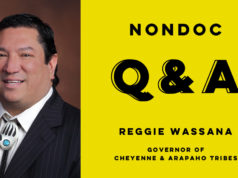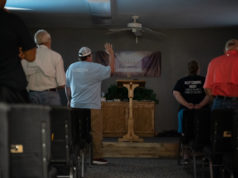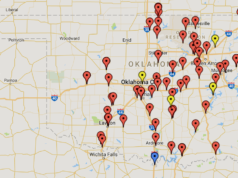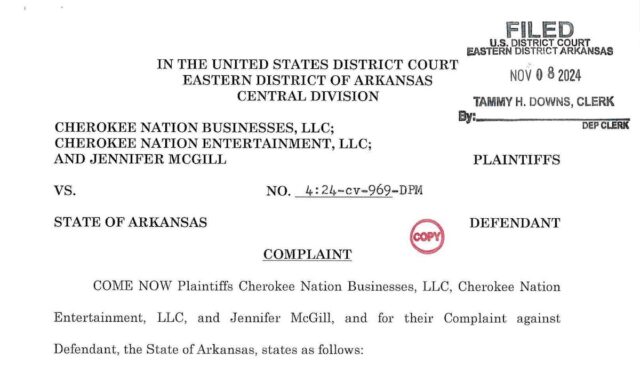

With the 2024 election season concluding, a few new tribal government officials are being sworn into office as well. The day before Oklahomans cast their presidential, legislative and state question ballots, voters of the United Keetoowah Band of Cherokee Indians voted on their own new leaders.
Meanwhile, on Nov. 5, a constitutional amendment supported by the Choctaw Nation passed in Arkansas to revoke a Cherokee Nation Entertainment casino license for Pope County. Now, the state amendment is facing a legal challenge in federal court from Cherokee Nation Businesses, the parent company of CNE.
In a more positive development for intergovernmental relations from earlier this year, the Chickasaw Nation has penned what appears to be the first cross-deputization agreement between a tribal government and a district attorney’s office to allow state investigators to cooperate better on cases involving Indigenous suspects within the nation’s Indian Country reservation.
Learn about those matters and more in the tribal roundup below.
Arkansas casino suit highlights battle between Choctaw, Cherokee nations
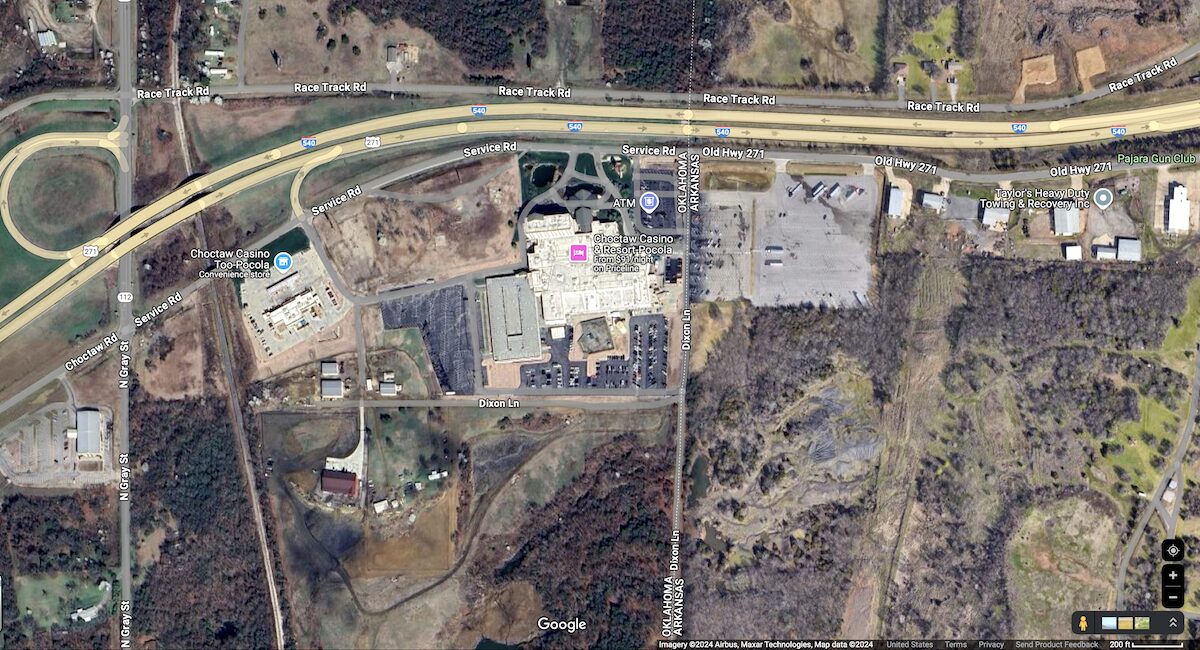
The Cherokee Nation has filed suit against the state of Arkansas after voters approved Issue 2, a constitutional amendment that revoked the license for Cherokee Nation Entertainment to operate a casino in Pope County, Arkansas. Funding for the casino’s opposition appears to have come largely from the Choctaw Nation, which spent more than $8.8 million supporting Issue 2, according to the Associated Press.
Cherokee Nation Businesses, a company owned by the nation, argued in court filings that the Choctaw Nation’s opposition to the Pope County casino proposal stems from fears it would compete with the existing Choctaw Casino & Resort in Pocola, a town of about 4,500 on the Arkansas border. Pope County is located about an hour and a half east of Fort Smith, and its county seat is Russellville.
“The parking lot for the (Choctaw) casino is in Arkansas, and the casino itself is in Oklahoma,” wrote the McDaniel Wolff, PLLC attorneys hired by CNB. “Choctaw Nation believes that if a casino comes to exist in Pope County, it will receive the benefit of customers that Choctaw Nation now enjoys from Arkansas, i.e. it will lose money.”
CNB’s petition argues that the Arkansas ballot initiative was misleading because it failed to inform voters the amendment would revoke CNE’s already granted casino license. The company alleges the election violated the nation’s due process right to notice and a hearing before its license was revoked and that it violated equal protection by singling out their license for revocation without a rational basis. The petition also alleges that the amendment violated the U.S. Constitution’s contracts clause.
The U.S. Constitution prevents states from “impairing the obligation of contracts,” one of America’s more obscure constitutional protections. CNB argues the amendment unconstitutionally nullified a contract with Pope County requiring them to pursue and utilize the casino license.
The nation also argues the amendment, which revoked the CNE license and will require countywide voter approval for future casino licenses, amounts to an unconstitutional taking. Licenses are usually considered a type of property, and CNB argues that revoking the license without “just compensation” is the legal equivalent of the state seizing property by referendum without compensation.
“The destruction of CNE’s property was not for public use,” the petition argues. “Rather, the abrogation of CNE’s property rights was arbitrary, served no public purpose, and in fact was to the sole benefit of an out-of-state entity, the Choctaw Nation.”
Arkansas Attorney General Tim Griffin told Little Rock’s KARK-TV he would “vigorously defend the state of Arkansas” while calling the lawsuit “baseless.”
Kendra McGeady appointed to Cherokee Nation Council
The Council of the Cherokee Nation confirmed Kendra McGeady as the newest member of the Tribal Council on Sept. 16. Currently the director of Pelivan Transit, McGeady formerly served as a member of the Cherokee Nation Gaming Commission and Cherokee Phoenix editorial board. She replaced Deputy Speaker of the Council Victoria Vazquez, who resigned Aug. 29, as the representative for District 11. Kevin Easley Jr. succeeded Vazquez as deputy speaker. Easley was elected to the Tribal Council representing District 14 in last summer.
“I’m very excited about this position,” McGeady said in the Cherokee Nation publication Anadisgoi. “I am most excited about representing the citizens of District 11 and working hard to continue the progress the Cherokee Nation has begun with housing, the new addiction treatment center for adults, and our wonderful cultural preservation. I am just looking forward to all of it.”
Vazquez, a Cherokee National Treasure and the daughter of Cherokee artist Anna Mitchell, was first elected to the council in a 2013 special election to succeed now-Principal Chief Chuck Hoskin Jr. She won reelection in 2017 and 2021 and served as the deputy speaker of the council from 2015 until her resignation.
Vazquez called her time on the council “a joy,” but she said she resigned to focus on her family.
“I can’t believe it has gone by as fast as it has,” Vasquez told the Cherokee Phoenix. “I’ve served under two wonderful administrations and with a lot of tribal councilors, and some have been here for quite a while. It’s been a joy. The best thing about the job is serving our citizens and helping those who may have nowhere else to turn.”
Jeff Wacoche elected UKB chief, three races head to runoff
On Nov. 4, United Keetoowah Band of Cherokee Indians voters elected Jeff Wacoche as the tribe’s new chief. Wacoche, the tribe’s current assistant chief, defeated Archie Buzzard with 449 votes (65 percent) to 239 votes (35 percent). Roxana Wilden was also certified to qualify for the election, according to election board records, but she ultimately did not appear on the final ballot.
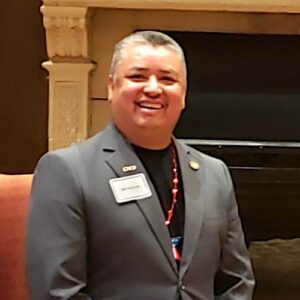
Chief Joe Bunch, who led the tribe for more than nine years, opted against running again.
“It was time for a successor,” Bunch said. “I promised my family that if I had a chance to do eight years, I would.”
Wacoche is set to be sworn into office Saturday, Jan. 4.
“I look forward to the opportunity to protect our sovereign rights as a tribe by strengthening our relationships with local, state, and federal agencies, along with members of the congressional delegation,” he said. “I will continue to build on the government-to-government relationships with these agencies to receive funding to improve the health, education, housing and overall wellbeing of our tribal membership.”
Meanwhile, the race for assistant chief is headed to a runoff set for Monday, Dec. 2, after Jamie Thompson, Amos Ketcher and Ernestine Berry each finished within 21 votes of one another. Thompson led with 242 votes (35 percent), followed by Ketcher with 234 votes (34 percent). Berry missed the runoff election by just 14 ballots after garnering 221 votes (32 percent).
Caleb Grimmett-Smith and Susan Adair also advanced to a runoff in the race for secretary. Grimmett-Smith led with 290 votes (42 percent) to Adair’s 229 votes (33 percent). Joyce Hawk was eliminated from the race after placing third with 177 votes (25 percent).
One legislative seat, the Goingsnake District, also advanced to a runoff between incumbent William Christie and challenger Sharon Benoit. Christie led with 49 votes (47 percent) to Benoit’s 37 votes (36 percent). Elmer J. Panther also ran and received 18 votes (17 percent).
Other UKB government officials elected include:
- Jeannie Tidwell defeated Clifford Wofford with 67 votes (66 percent) votes to 34 votes (34 percent) in the Cooweescoowee District;
- Charles Smoke defeated John Wayne Mouse with 50 votes (58 percent) to 36 votes (42 percent) in the Saline District;
- Tishaleta Guevara was elected without opposition to succeed Panther in the Delaware District;
- Incumbent Frankie Still was elected without opposition in the Flint District;
- Sammy Allen defeated Teresa Hair with 107 votes (54 percent) to 93 votes (46 percent) in the Tahlequah District;
- Donald Adair was elected without opposition to succeed Junior Levi Catron in the Sequoyah District; and
- Janelle Adair was elected without opposition to succeed Peggy Girty in the Illinois District.
The United Keetoowah Band of Cherokee Indians broke away from the Cherokee Nation in 1859 ahead of the U.S. Civil War. With a one-quarter Cherokee blood quantum for citizenship, the 14,000-person tribe has long struggled to gain economic footing owing to the Cherokee Nation’s opposition to UKB attempts to place land into trust and reopen a casino. In October 2023, a committee of the Oklahoma Legislature rejected a UKB casino gaming compact signed with Gov. Kevin Stitt, and federal litigation over the matter is pending.
Chickasaw Nation cross-deputizes DA investigators
In July, the Chickasaw Nation and District Attorney Jason Hicks penned a cross-deputization agreement to provide District 6 DA investigators with the same authority as the Chickasaw Lighthorse Police Department. The agreement allows investigators to work Chickasaw Nation cases and formalizes the working relationship between the government agencies.
Hicks, the elected prosecutor for Caddo, Grady, Jefferson and Stephens counties, signed the agreement alongside Gov. Bill Anoatubby. The agreement appears to be one of the first in Oklahoma between a district attorney’s office and a tribal government. Cross-deputization agreements most commonly occur between tribal police departments and municipal police departments or county sheriff offices, although the Drug Task Force in District Attorney Erik Johnson’s District 22 entered into a cross-deputization agreement with the Muscogee Nation.
In the months since the July agreement was signed between the Chickasaw Nation with Hicks’ investigators, several other tribal cross-deputization agreements have been filed with municipalities and school districts:
- Muscogee Nation: the City of Oilton, City of Kellyville, City of Beggs, City of Catoosa, and the City of Drumright.
- Cherokee Nation: Tulsa Public Schools and Sallisaw Public Schools.
- Chickasaw Nation: Velma-Alma Public Schools (reciprocal with campus police).
- Choctaw Nation: McAlester Public Schools (reciprocal with campus police)
Osage see Oklahoma’s largest land-to-trust application approved
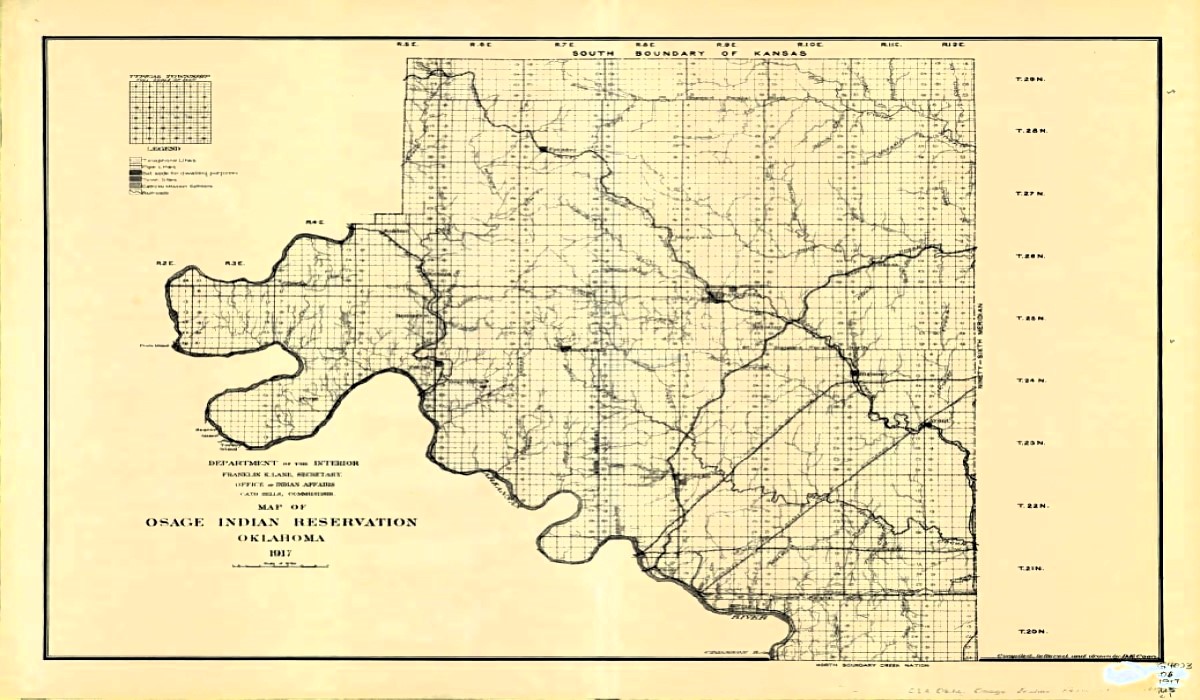
In August, the Bureau of Indian Affairs approved an application by the Osage Nation to put 41,521 acres of Osage County into trust for the tribal government in August, the largest land-to-trust application approved in Oklahoma history. Trust lands are lands legally owned by the United States federal government for the benefit of tribal governments and are legally “Indian Country,” a term of art for places where tribal authority is at its highest.
Principal Chief Geoffrey Standing Bear praised the BIA’s acceptance of the Osage Nation application, which was submitted in 2016.
“This is a momentous day for the Osage Nation. I am humbled and grateful for all those who stayed the course to make this happen,” Standing Bear said. “Every day, Osages are working to uphold our sovereignty in various ways, both big and small, and this is the result of those efforts. Our nation is stronger because of our people and our perseverance in upholding what is ours. We’re getting our land back.”
The nation purchased the large Osage County ranch from billionaire Ted Turner for $74 million in 2016. Applications to put land into trust require approval from the BIA and often take several years for approval.
While the Oklahoma Court of Criminal Appeals recently held that the tribe lacks criminal jurisdiction over its territory because the formal Osage Nation Reservation was disestablished — a conclusion that could be reviewed by the 10th Circuit Court of Appeals in a future case — tribal governments do have criminal jurisdiction over crimes committed on trust lands. The approval of the land-to-trust application effectively increases the jurisdiction of the tribe by several thousand acres.










